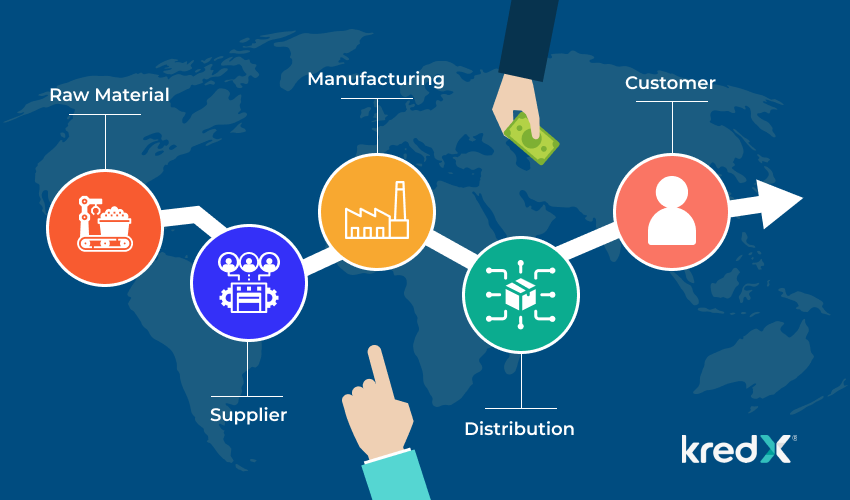
Discover the Advantages of Supply Chain Finance for Your Business
Supply Chain Finance is a financial solution that enables businesses to optimize their working capital by providing financing options to the different parties involved in the supply chain, including suppliers, buyers, and intermediaries. It helps businesses manage their cash flow by providing access to low-cost funding that is based on the creditworthiness of the entire supply chain.
How Supply Chain Finance Works?
Supply Chain Finance works by leveraging the creditworthiness of the buyer to provide financing options to their suppliers. In traditional supply chain financing, suppliers are typically paid on credit terms ranging from 30 to 90 days, which can lead to cash flow challenges. With supply chain finance, suppliers can receive early payment from a third-party financier at a lower cost than what they would have paid for traditional financing options such as bank loans or factoring.
Example Of Supply Chain Finance
For example, suppose a large retailer buys products from a supplier on credit terms of 60 days. The supplier can opt for supply chain finance and receive early payment from a financier who uses the creditworthiness of the retailer to provide a lower-cost financing option. The financier pays the supplier within a few days of receiving the invoice from the supplier, while the retailer continues to pay the financier on the original 60-day credit term. This enables the supplier to receive early payment and improve their cash flow, while the retailer benefits from better supplier relationships and reduced supply chain risk.
The benefits of Supply Chain Finance for businesses include
1. Improved Cash Flow
Supply chain finance enables businesses to improve their cash flow by providing early payments to suppliers and optimizing their working capital.
2. Lower Financing Costs
Supply chain finance provides a lower-cost financing option compared to traditional financing options such as bank loans or factoring.
3. Enhanced Supplier Relationships
Supply chain finance helps businesses build stronger relationships with their suppliers by providing early payment options and improving their overall financial health.
4. Reduced Supply Chain Risk:
Supply chain finance helps businesses reduce their supply chain risk by ensuring the financial stability of their suppliers.
Supply Chain Finance can benefit both buyers and suppliers in several ways as discusses below –
Benefits for Buyers
1. Improved Supplier Relationships
Supply chain finance provides buyers with an opportunity to offer early payment options to their suppliers, which can help build stronger relationships between the two parties.
2. Lower Supply Chain Risk
By providing early payment to their suppliers, buyers can reduce the risk of supply chain disruptions due to financial issues faced by their suppliers.
3. Optimized Working Capital
Buyers can optimize their working capital by extending their payment terms and using supply chain finance to provide early payment to their suppliers.
4. Reduced Cost of Goods Sold
Supply chain finance can help reduce the cost of goods sold by negotiating lower prices with suppliers who are willing to accept early payment.
Benefits for Suppliers
1. Improved Cash Flow
Supply chain finance provides suppliers with an opportunity to receive early payment for their invoices, which can help improve their cash flow and reduce the need for expensive financing options.
2. Lower Cost of Financing
Supply chain finance provides suppliers with a lower-cost financing option compared to traditional financing options such as bank loans or factoring.
3. Reduced Credit Risk
Supply chain finance helps reduce the credit risk for suppliers by leveraging the creditworthiness of the buyer and providing financing based on the strength of the entire supply chain.
4. Increased Sales Opportunities
By offering early payment options, suppliers can attract more business from buyers who are looking for ways to optimize their working capital and reduce supply chain risk.
In summary, supply chain finance benefits both buyers and suppliers by improving supplier relationships, reducing supply chain risk, optimizing working capital, and providing lower-cost financing options. By leveraging the strength of the entire supply chain, supply chain finance can help businesses manage their finances more effectively and create a win-win situation for all parties involved.
While Supply Chain Finance offers several benefits to businesses, there are also some potential disadvantages to consider, including:
1. Complexity:
Supply Chain finance programs can be complex and require significant coordination between buyers, suppliers, and financiers, which can be challenging to manage.
2. Cost:
While Supply Chain finance provides a lower-cost financing option compared to traditional financing options such as bank loans or factoring, there are still costs associated with the program, including fees charged by the financier.
3. Limited Availability:
Supply Chain finance may not be available to all suppliers, particularly smaller or less creditworthy suppliers who may not meet the eligibility requirements of the program.
4. Risk:
While Supply Chain finance can help reduce supply chain risk, it can also introduce new risks, such as counterparty risk, where the failure of one party in the supply chain can have a ripple effect on the others.
5. Dependency:
Supply Chain finance can create a dependency on the program, where suppliers may become reliant on early payment and may not be able to operate without it, which can create a risk if the program is discontinued.
In summary, while Supply Chain finance offers many benefits, it is important to consider the potential disadvantages and carefully evaluate whether the program is the right fit for your business and your supply chain partners. Businesses should weigh the costs and benefits of Supply Chain finance and work with experienced advisors to help manage the complexity of the program.
Conclusion:
Supply Chain Finance is a financial solution that enables businesses to optimize their working capital, improve their cash flow, and build stronger relationships with their suppliers. It is a win-win situation for all parties involved in the supply chain, and it can help businesses manage their finances more effectively.



